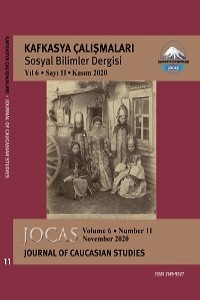Common Identity as the Missing Element in the Construction of Regionalism in the South Caucasus [Güney Kafkasya’da Bölgeciliğin Kurulmasında Eksik Unsur Olan Ortak Kimliğin Tahlili]
Güney Kafkasya’nın bir bölge olarak varlığı görece tartışmalı bir konudur. Coğrafi yakınlıklarına ve ortak tarihi ve kültürel geçmişlerine rağmen bölgenin üç ülkesi (Ermenistan, Azerbaycan, Gürcistan) kendilerini bölgesel bir “Güney Kafkasya” kimliğinin parçası olarak görmemekte; ortak sorunlara bölgesel çözüm arayışına girmemekte veya iki taraflı ilişkilere ek olarak bölgesel ekonomik işbirliği geliştirme girişiminde bulunmamaktadırlar. 20. yy boyunca birçok entegrasyon projesi yaratma denemeleri olmuşsa da tümü tarihsel kökenli derin husumetler, tepeden inme entegrasyon projelerinin yetersizliği ve bölge devletlerinin 1918-1920 yılları arasındaki bağımsızlık dönemlerinde, Sovyet döneminde veya günümüzdeki farklı tehdit algılamaları nedeniyle başarısız olmuştur. Bu makale Güney Kafkasya’da entegrasyonun başarısızlığının ana nedeni olarak ortak kimlik eksikliğinin ne ölçüde etkili olduğunu ve yakın gelecekte ortak bir Güney Kafkasya kimliğinin kurulma olasılığını tartışmaktadır.
Anahtar Kelimeler:
Güney Kafkasya, milli kimlik, etnik çatışma, bölgecilik, entegrasyon
Common Identity as the Missing Element in the Construction of Regionalism in the South Caucasus [Güney Kafkasya’da Bölgeciliğin Kurulmasında Eksik Unsur Olan Ortak Kimliğin Tahlili]
The understanding of the South Caucasus as a region is a relatively disputable concept. Despite their geographic proximity and common historical and cultural background, the three states of the region (Armenia, Azerbaijan and Georgia) do not perceive themselves in the context of a regional “South Caucasian” identity and do not make any attempts to pursue regional solutions to common problems or develop any economic cooperation on a regional, rather than a bilateral level of relations. Although several attempts were made to create integration projects throughout the history of the twentieth century, all of them failed due to the deep-rooted historical enmity, artificial character of the top-down integration and different visions of threat among the states of the region either during the years of independence in 1918-1920, the Soviet period or in the current days. This article will discuss to what extent the lack of common identity between nations became the main reason of the failure of integration in the South Caucasus and whether there is a potential for the establishment of common South Caucasian identity in the near future.
Keywords:
South Caucasus, national identity, ethnic conflict, regionalism, integration,
___
- Asatiani, Salome. “CIS: Is South Caucasus “Region” an Artificial Construct?”, Radio Free Europe/Radio Liberty, 30 May 2007, www.rferl.org/a/1076814.html
- Babayan, Mamikon. “Armenia-Azerbaijan: how music brings nations together”, Vestnik Kavkaza, 4 March 2019, vestnikkavkaza.net/analysis/Armenia-Azerbaijan-how-music-brings-nations-together.html
- Bishku, Michael. “Is the South Caucasus Region a Part of the Middle East?”, Journal of Third World Studies, 32.1 (2015): 83-102.
- Broers, Laurence interview to Anna Ohanyan, 2013, Anna Ohanyan, Networked Regionalism as Conflict Management. Stanford: Stanford University Press, 2015.
- Buzan, Barry and Ole Wæver. Regions and Powers: The Structure of International Security. Cambridge: Cambridge University Press, 2003.
- Cornell, Svante. Small Nations and Great Powers: A Study of Ethnopolitical Conflict in the Caucasus. London: Routledge, 2001.
- De Waal, Thomas. Black Garden. Armenia and Azerbaijan through Peace and War. New York: New York University, 2003.
- ____ “A Broken Region: The Persistent Failure of Integration Projects in the South Caucasus”, Europe-Asia Studies, 64.9 (2012): 1709-1723. doi: 10.1080/09668136.2012.718416
- ____ “The Caucasus: a Region in Pieces”, Open Democracy, 8 January 2009. https://www.opendemocracy.net/en/the-caucasus-a-region-in-pieces/
- ____ “Why the Long Conflict Over Nagorno-Karabakh Could Heat Up Again”, World Politics Review, 18 October 2019. www.worldpoliticsreview.com/articles/28275/why-the-long-conflict-over-nagorno-karabakh-could-heat-up-again
- ”Envisioning Peace. An Analysis of Grassroots Views on the Nagorny Karabakh Conflict”, International Alert, October 2018. www.international-alert.org/sites/default/files/Caucasus_EnvisioningPeace_EN_2018.pdf
- “First General Census of the Population of Russian Empire, 1897”. Accessed 3 December 2019. www.demoscope.ru/weekly/ssp/emp_lan_97_uezd.php?reg=570
- German, Tracey. “Good Neighbors or Distant Relatives? Regional identity and cooperation in the South Caucasus”, Central Asian Survey, 31.2 (2012): 137-151. doi: 10.1080/02634937.2012.671990
- Guliyev, Elmir. “Religion in the Central Caucasus: Current State and Future Trends” in South Caucasus: 2021, edited by Fariz Ismailzade and Glen E. Howard, Washington, DC: The Jamestown Foundation, 2012. 3-34.
- Ismailov, Eldar. “On Integration And the Conception of the Central Caucasus”. The Central Caucasus: Essays on Geopolitical Economy. Eds. Eldar Ismailov and Vladimer Papava. Stockholm: CA&CC Press, 2006. 5–19.
- Kuchins, Andrew and Jeffrey Mankoff. “The South Caucasus in a Reconnecting Eurasia”, Center for Strategic and International Studies, October 2016.
- Leupold, David. “The echoes of the Disappeared Rabiz Music as a Reverberation of Armenian-Azerbaijani Cohabitation”, Caucasus Edition, 1 September 2018. caucasusedition.net/the-echoes-of-the-disappeared-rabiz-music-as-a-reverberation-of-armenian-azerbaijani-cohabitation/
- Mankoff, Jeffrey. “The Big Caucasus: Between Fragmentation and Integration”, Center for Strategic and International Studies, March 2012.
- Mkrtchyan, Tigran and Vahram Petrosyan. “Integration of Transcaucasia: Continued Failure and Hope”, Turkish Quarterly, Spring 2009, 59-76.
- Paul, T.V, ed. International Relations Theory and Regional Transformation. Cambridge: Cambridge University Press, 2012.
- Saakashvili Mikheil “Remarks at the 65th Session of the United Nations General Assembly” (speech, New York, 23 September 2010). Civil Georgia, www.civil.ge/files/files/Saakashvili-UN-speech-220910.pdf
- Shafiyev, Farid. “The Forced Resettlement of Azerbaijanis from Armenia, 1948–1953”, Journal of Muslim Minority Affairs, 39.2 (2019): 177-198.
- Shcherbak, Andrey. “Nationalism in the USSR: A Historical and Comparative Perspective”, Nationalities Paper, 43.6 (2015): 866-885.
- Smith, Jeremy. “A Region of Regions: a Historical Failure of Integration in the South Caucasus”. The South Caucasus beyond Borders, Boundaries and Division Lines. Conflicts, Cooperation and Development. Eds. Mikko Palonkorpi, Turku: Juvenes Print, 2015. 1-9.
- Suleymanov, Elin. Emergence of New Political Identity in the South Caucasus: Energy, Security, Strategic Location and Pragmatism, The Fletcher School, MA Thesis, 2004.
- ISSN: 2149-9527
- Yayın Aralığı: Yıllık
- Başlangıç: 2015
- Yayıncı: Murat TOPÇU
